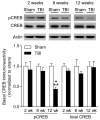Deficits in ERK and CREB activation in the hippocampus after traumatic brain injury
- PMID: 19416748
- PMCID: PMC2695936
- DOI: 10.1016/j.neulet.2009.04.064
Deficits in ERK and CREB activation in the hippocampus after traumatic brain injury
Abstract
Traumatic brain injury (TBI) activates several protein kinase signaling pathways in the hippocampus that are critical for hippocampal-dependent memory formation. In particular, extracellular signal-regulated kinase (ERK), a protein kinase activated during and necessary for hippocampal-dependent learning, is transiently activated after TBI. However, TBI patients experience hippocampal-dependent cognitive deficits that occur for several months to years after the initial injury. Although basal activation levels of ERK return to sham levels within hours after TBI, we hypothesized that activation of ERK may be impaired after TBI. Adult male Sprague-Dawley rats received either sham surgery or moderate parasagittal fluid-percussion brain injury. At 2, 8, or 12 weeks after surgery, the ipsilateral hippocampi of sham surgery and TBI animals were sectioned into transverse slices. After 2h of recovery in oxygenated artificial cerebrospinal fluid, the hippocampal slices were stimulated with glutamate or KCl depolarization, then analyzed by western blotting for phosphorylated, activated ERK and one of its downstream effectors, the transcription factor cAMP response element-binding protein (CREB). We found that activation of ERK (p<0.05) and CREB (p<0.05) after 30s of glutamate stimulation or KCl depolarization was decreased in hippocampal slices from animals at 2, 8, or 12 weeks after TBI as compared to sham animals. Basal levels of phosphorylated or total ERK were not significantly altered at 2, 8, or 12 weeks after TBI, although basal levels of phosphorylated CREB were decreased 12 weeks post-trauma. These results suggest that TBI results in chronic signaling deficits through the ERK-CREB pathway in the hippocampus.
Figures




References
-
- Ashman TA, Cantor JB, Gordon WA, Sacks A, Spielman L, Egan M, Hibbard MR. A comparison of cognitive functioning in older adults with and without traumatic brain injury. J Head Trauma Rehabil. 2008;23:139–148. - PubMed
-
- Atkins CM, Chen S, Alonso OF, Dietrich WD, Hu BR. Activation of calcium/calmodulin-dependent protein kinases after traumatic brain injury. J Cereb Blood Flow Metab. 2006;26:1507–1518. - PubMed
-
- Atkins CM, Selcher JC, Petraitis JJ, Trzaskos JM, Sweatt JD. The MAPK cascade is required for mammalian associative learning. Nat Neurosci. 1998;1:602–609. - PubMed
-
- Baron C, Benes C, Van Tan H, Fagard R, Roisin MP. Potassium chloride pulse enhances mitogen-activated protein kinase activity in rat hippocampal slices. J Neurochem. 1996;66:1005–1010. - PubMed
Publication types
MeSH terms
Substances
Grants and funding
LinkOut - more resources
Full Text Sources
Other Literature Sources
Miscellaneous

